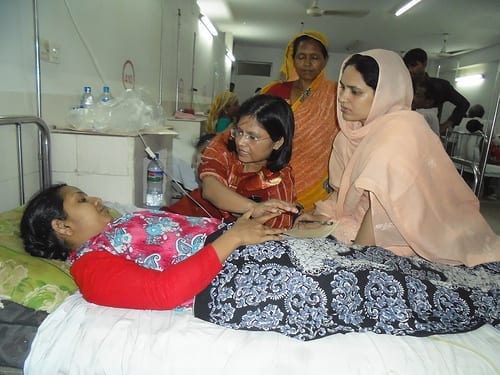
Apr 16, 2015
In the hours and days after the multistory Rana Plaza building collapsed in 2013, killing more than 1,100 garment workers in Bangladesh, Solidarity Center Senior Program Officer Lily Gomes was an ever-present figure in the hospitals, where she went from bed to bed checking on injured workers and offering support. She also visited workers at their homes, to offer assistance and to document details of the world’s deadliest garment factory disaster.
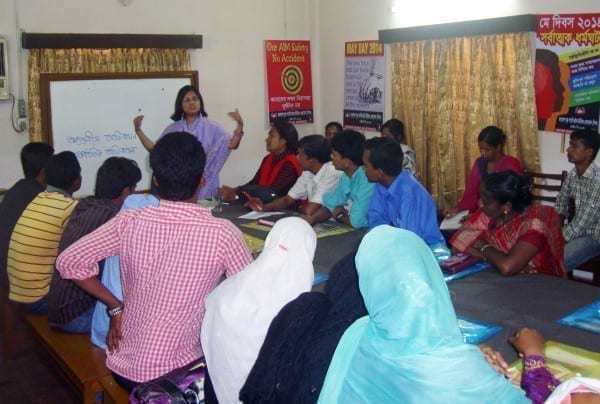
Lily Gomes has conducted hundreds of trainings for Bangladesh garment workers. Credit: Solidarity Center
Providing emergency aid is one of a multitude of duties Gomes has undertaken since joining the Solidarity Center’s Dhaka office in 1996. Trainer, union organizer, curriculum developer, gender specialist and financial program monitor—over the years, Gomes has carried out these roles and many more, earning a doctorate in sociology from Jadavpur University in India along the way. Now, she has a new title: Fellow at the National Endowment for Democracy in Washington, D.C.
“This is the time clearly to focus on women garment workers to have them in leading positions,” Gomes says of her plans while in residence. During her five month-long Reagan-Fascell fellowship, she will develop a gender policy guideline for advancing women’s leadership among trade unions within Bangladesh’s ready-made garment (RMG) industry. “This is the time for women to express their voices.”
She brings to the fellowship a rare range and depth of experience. Gomes was among Solidarity Center staff aiding garment workers forming their first women-led union in 1996. “I was with them day and night,” she says, recounting the long hours involved in creating the Bangladesh Independent Garment Workers Union Federation (BIGUF), a milestone achievement not only for worker rights but one that “initiated the idea that women should be the main leadership to reflect the workers in the RMG industry in Bangladesh.”
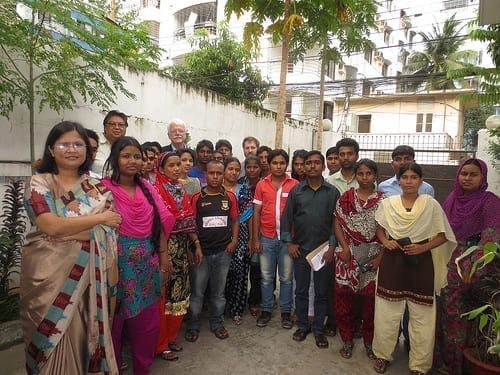
Lily Gomes (front, left) and Bangladesh garment workers met with then-U.S. Rep. George Miller in 2013 about factory working conditions. Credit: Solidarity Center
In those years, child labor was rampant, and Gomes describes how factory owners would hide children in boxes or even toilets when inspectors arrived. Passage of the Child Labor Deterrence Act of 1999, long championed by former Sen. Tom Harkin, “was a huge thing for Bangladesh that assisted in complete elimination of child labor from the sector at the time,” Gomes says. The bill bans the importation to the United States of products that are manufactured or mined with child labor.
Following the law’s passage, Gomes helped the Solidarity Center set up and run schools for former child laborers “with a unique curriculum to address their needs,” a project that continued through 2002.
“The children were happy,” Gomes recalls. “They started relaxing. They learned not only academics but social issues,” including health and hygiene.
Gomes was coordinator of Solidarity Center-sponsored health clinics offering primary medical care for garment workers and their families. Over the years, she has provided workers with training sessions on topics as varied as labor law, financial management and collective bargaining negotiations. She also conducts fire safety training, a program the Solidarity Center pioneered for garment factory workers in 2000. In addition to helping garment workers unionize, she has assisted shrimp workers to organize and exercise their rights in seafood processing factories in southwestern Bangladesh.
Now, much of her focus is on empowering women garment workers to take on leadership roles and understand their rights to better advocate for themselves and their families. Although women comprise more than 90 percent of garment factory workers, during negotiations at unionized plants, “Women’s issues are sidelined in negotiations,” Gomes says.
“For instance, like ensuring contract language that includes breaks for breast-feeding and special care for pregnant women.” Women also have less access to better paying jobs and supervisory positions, outcomes generated by “socially built gender discrimination.”
In 2000, Gomes administered four Solidarity Center-sponsored Working Women Education Centers, where lawyers trained female factory workers on their rights regarding sexual harassment at the workplace, family leave and other issues important to women. Since then, she has reached hundreds of women workers through trainings on women’s labor rights and gender equality.
“Now, many of these Solidarity Center-trained women are leaders of other union federations,” Gomes says. “It’s a great feeling to know I trained them.”
In the late 2000s, she commuted for several years to India’s West Bengal state, to work on her Ph.D., which focused on the impact of employment and earning opportunities on female workers in Bangladesh’s RMG sector.
Beyond her organizational skills, educational background and talent for expertly taking on a broad range of tasks, Gomes brings to her work a compassion and deep understanding of humanity that sets her apart.
Recalling the hours after the Rana Plaza disaster, she describes visiting a school where bodies, nearly all young women, were laid out in row after row.
“I touched their hands and feet,” she said, “and felt like they were my sisters.”
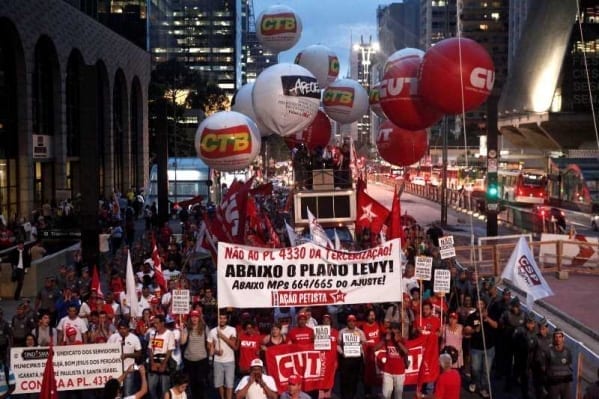
Apr 15, 2015
Brazil lawmakers have postponed a vote on a bill that would expand job outsourcing after a series of union-led protests drew tens of thousands of workers to streets across the country. The law would allow public and private employers to contract out all jobs, enabling employers to replace workers who have direct employment contracts with employees who could be paid up to 25 percent less. Some 12 million Brazilians already are employed as outsourced contractors, principally in cleaning and security services.
The Central Unica dos Trabalhadores (CUT), Central dos Trabalhadores e Trabalhadoras do Brasil (CTB), Intersindical, CONLUTAS and other unions spearheaded two national days of protest against the bill, most recently on April 15, when unions led peaceful protests in the capitals of all 27 Brazilian states. In São Paulo, more than 10,000 participants, including housing activists and student groups, temporarily stopped traffic on the city’s main roads. Uniao Geral dos Trabalhadores (UGT) also recently joined the coalition opposing the bill.
During similar protests on April 7, military police in Brasilia, the capital, blocked union members from entering the spectators’ gallery of the Congress, detaining four people and injuring eight others, according to the global union IndustriALL.
Under the bill, PL 4330, companies that contract outsourced services would not be directly responsible for any violations of outsourced workers’ labor rights. It also would allow outsourced workers to be represented by outsourced workers unions, and not by the unions that represent the directly-contracted workers at the companies where they are employed.
Lawmakers are expected to take up the bill next week.
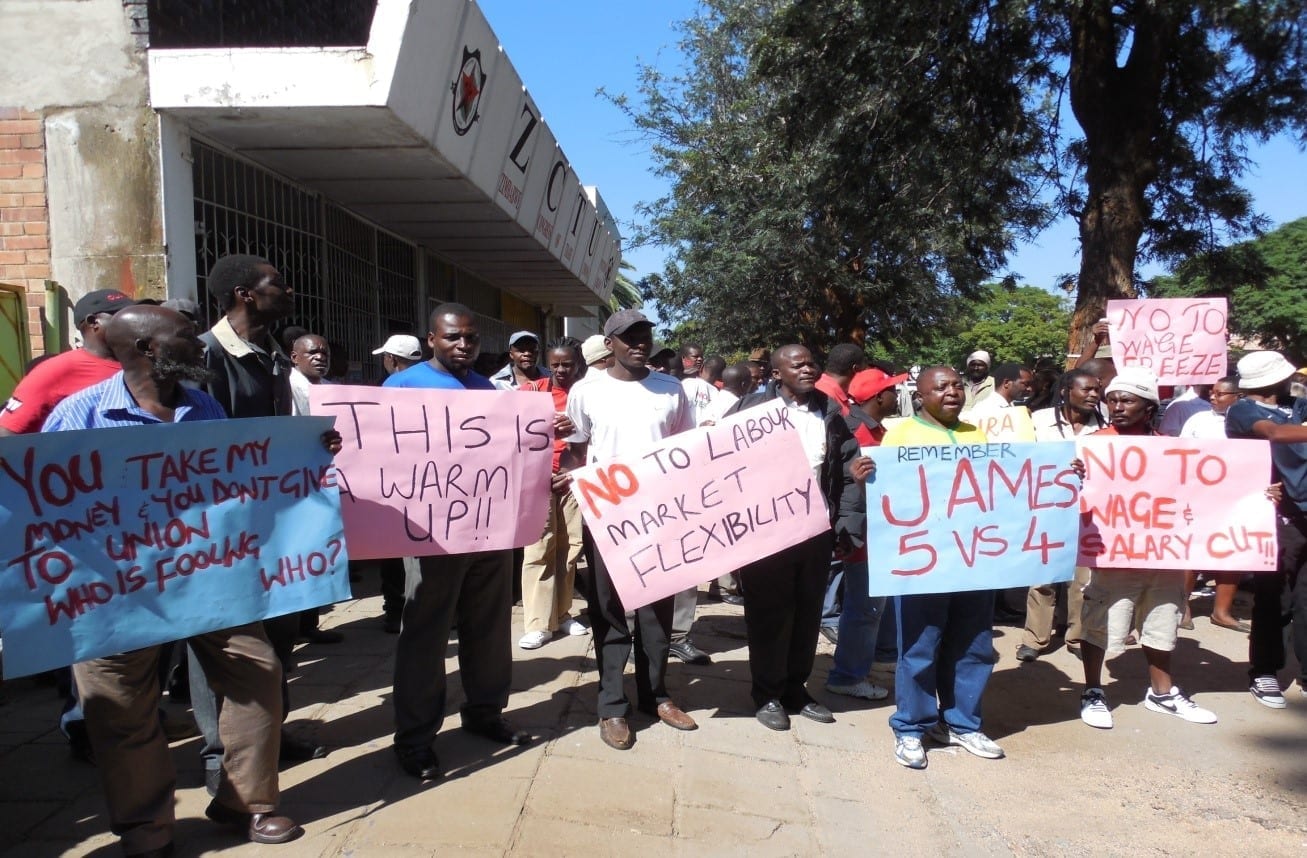
Apr 13, 2015
Fed up with unpaid wages, salaries that are below the poverty line, few jobs available in the formal sector and a proposed wage freeze, Zimbabwe workers took to the streets in six cities Saturday to demand workers be paid and to petition the government to not arbitrarily change the labor law to empower employers to fire workers.
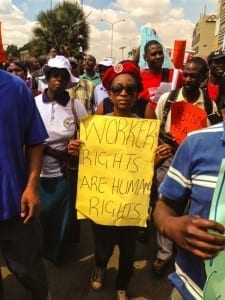
Workers rallied in cities across Zimbabwe Saturday. Credit: Thando Khoza
Carrying signs reading “Worker rights are human rights,” and “This year, we are not backing down,” workers presented government officials with a petition demanding officials honor their pledge to create 2 million jobs and rethink the introduction of so-called labor market flexibility, in which the brunt of economic reform falls on workers. (Read the full petition.)
“Senior government officials, including the minister of finance, want to turn the worker into a form of cheap labor,” Zimbabwe Congress of Trade Unions (ZCTU) President George Nkiwane said at the rally. “While it is the ordinary worker that is being made to suffer, the government is not taking any meaningful action on chief executives who are bleeding the economy by paying themselves huge salaries and perks.”
Wages average less than $250 a month—for the 30 percent of the population working in the formal economy—while the cost of living is as high as in New York City. Some 72 percent of the population lived below the poverty line in 2013. Increasing numbers of Zimbabweans are forced to seek a living in informal economy jobs like street vending, in which they have no income security and few, if any, social benefits like health care.
“We used to have over 1.5 million workers in the formal sector 10 years ago, but we would be lucky if we have 700,000 in the formal sector (today),” Nkiwane said.
Women are disproportionately represented in poor-paying informal economy jobs, and young workers in urban areas also lack jobs that pay a living wage, the ZCTU petition noted. Employers also increasingly subcontract dangerous jobs, and so avoid paying compensation to workers injured or made ill while on the job, the petition stated.

Fake press releases and pamphlets were distributed in advance of the rally, falsely stating the rallies had been cancelled. Credit: ZCTU
Protestors turned out in Bulawayo, Chinhoyi, Gweru, Harare, Masvingo and Mutare despite a campaign to fool workers into thinking the rally had been cancelled. Fake press releases and pamphlets, purportedly from ZCTU, were distributed in several cities in advance of the rally, telling workers it had been canceled.
The march took place in an increasingly threatening environment for activists. Last month, Itai Dzamara, a leading pro-democracy advocate, was abducted. He remains missing, and leading civil society organizations—including the ZCTU—are calling on the government to ascertain his whereabouts and prosecute his abductors.
Police in the cities of Bulawayo, Mutare and Masvingo initially refused to grant permission for the demonstrations, but reversed their decisions after the Harare police agreed to allow the demonstration there, according to the International Trade Union Confederation (ITUC).
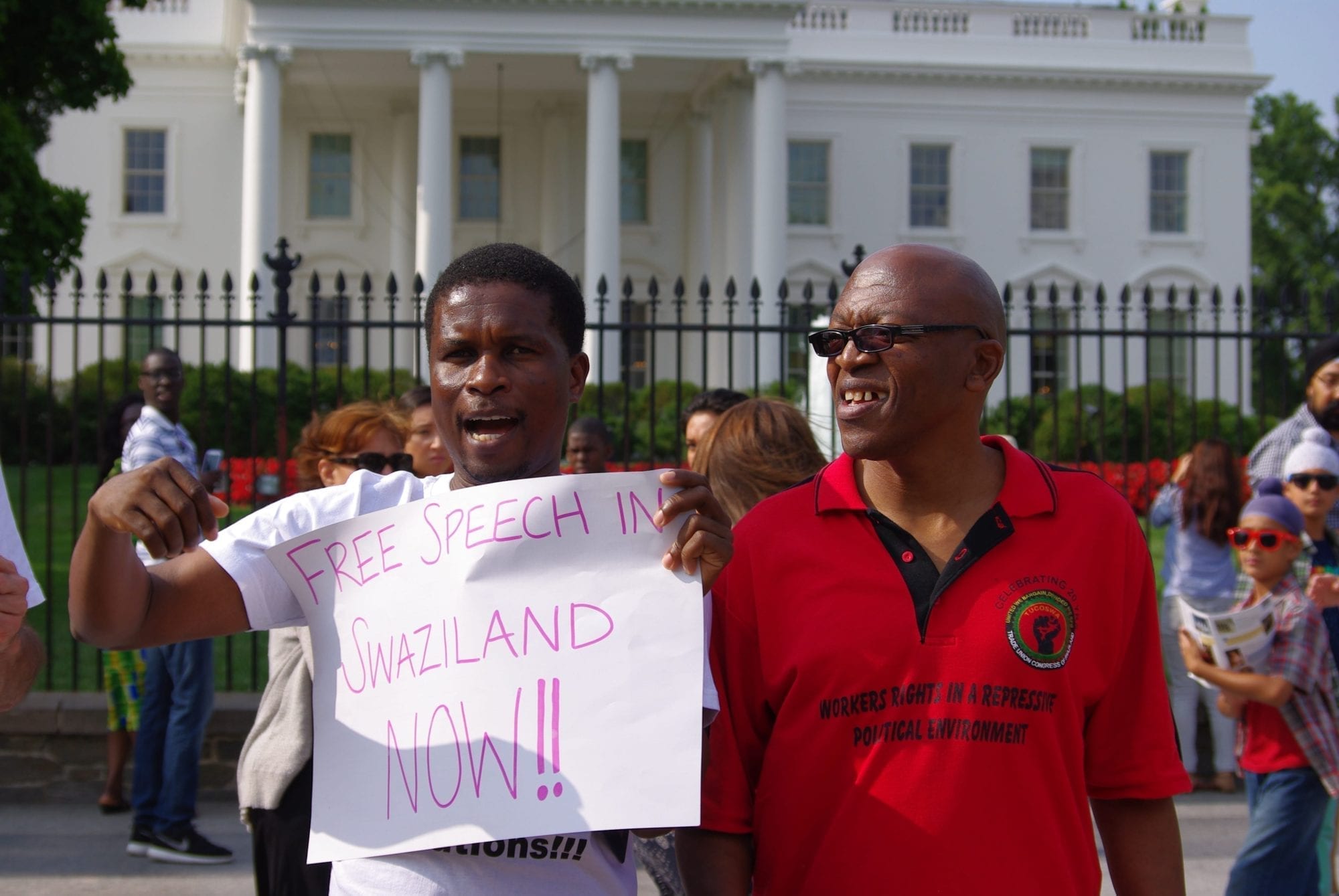
Apr 13, 2015
Swaziland’s union movement cancelled a planned rally over the weekend after concerns the police would break up the gathering as they have multiple times in the past several weeks. In February and March, large numbers of police disbanded meetings of the Trade Union Congress of Swaziland (TUCOSWA), injuring at least one union leader.
Two weeks ago, the Swaziland National Association of Teachers (SNAT) gathered for a prayer service, when a large number of police showed up and sought to disrupt the event, physically injuring the union’s secretary general in the process, according to union leaders. Union members refused to be intimidated and carried on their service, say union leaders, adding that the government is increasingly prohibiting workers from meeting or publicly speaking out.
“The government of the Kingdom of Swaziland has really ensured that the country is viewed as a democracy only in name … as it continues to crush any get-together organized by TUCOSWA,” says TUCOSWA Secretary General Vincent Ncongwane.
Workers also are enduring large-scale job loss, with 850 textile workers laid off last month, the latest in mass firings targeting in the garment sector.
Ncongwane notes that on April 12, 1973, Swaziland banned political parties. Forty-five years later, when Swazi workers sought to commemorate “the day democracy died in Swaziland,” workers again were denied their fundamental democratic rights.
“Imagine the lack of logic of denying workers the right to discuss issues of democracy, among other things, simply at the instruction of a regional commissioner of police and not because of any violation of any law but because of a misplaced fear that would be dangerous for the country,” Ncongwane says. “That makes our country so fragile.”
The 2014 U.S. State Department human rights report cited serious human rights violations in Swaziland, including arbitrary or unlawful killings by the government or its agents; severely restricted freedom of assembly, including violence against protestors; jailing of trade union leaders; the deregistration of TUCOSWA and the banning of strikes.
“We have seen numerous countries being changed, and drastically, so when the tide starts to turn against suppression, Swaziland cannot be the exception,” Ncongwane says.
TUCOSWA is now planning a May 1 public event, and is seeking a court order allowing the action to take place.
In June 2014 the U.S. government took the rare step of suspending African Growth and Opportunity Act (AGOA) trade benefits for Swaziland, citing the Swazi government’s systematic violations of fundamental worker rights, including refusal to legally recognize TUCOSWA. Swaziland’s trade unions support AGOA, but maintain that the country must meet benchmarks of the agreement, which include respecting human rights and labor rights.
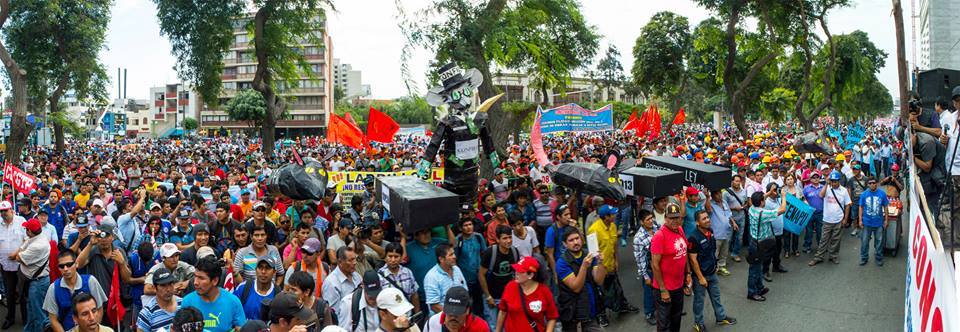
Apr 13, 2015
After thousands of Peruvian workers took to the streets on Thursday, the Peruvian government backed off a proposal (Supreme Decree 4008) that would have made it easier for employers to conduct mass layoffs. The proposed legislation also would have allowed employers to provide wage increases, up to 20 percent, in the form of bonuses which are not included in calculating benefits, and it would have limited the Labor Ministry’s oversight.
Spearheaded by the General Confederation of Workers of Peru (CGTP), the action led to workers’ second big victory this year. In December, young workers mobilized up to 30,000 workers and their allies in a series of marches protesting a new law that reduced salaries and benefits for workers under age 25. Lawmakers repealed the law in January.
Still on the books is a law passed in December that makes it easier for companies to conduct mass layoffs if they show two consecutive months of financial losses. This legislation, Supreme Decree 013, allows employers to eliminate 10 percent of their workforce if they can meet stipulated criteria—a loophole that empowers employers to target trade unionists, pregnant women, workers suffering from occupational safety and health illnesses and older workers. CGTP leaders, who met last week with the National Labor Council, say they are making progress in discussions to amend the law, and are meeting with the Prime Minister today.
Union leaders say worker awareness, mobilization and union-driven proposals for labor law reform are key to passing measures to improve workers’ standard of living, beat back regressive labor reforms and create the conditions for regaining union density and decent work in Peru.
The union movement plans further rallies and strikes in coming months, with public-sector workers set to mobilize for their rights on Wednesday.
In July 2013, the government passed a new civil service law that eliminated the right of more than 500,000 public administration workers to collectively negotiate salaries, narrows the definition of the type of unions they could establish and prevents “essential service” unions from striking (without defining essential services).
Public employees say the law violates International Labor Organization (ILO) Convention 151 that protects the right of public-sector workers to form unions. They are seeking to raise their case at Committee on Application of Norms in the annual ILO conference in June 2014. All four confederations are formally coordinating to take the issue to the meeting, and together with the global union Public Services International, the Solidarity Center is working to prepare the labor delegates for a united front to advocate on this key Peruvian labor issue at the ILO.









